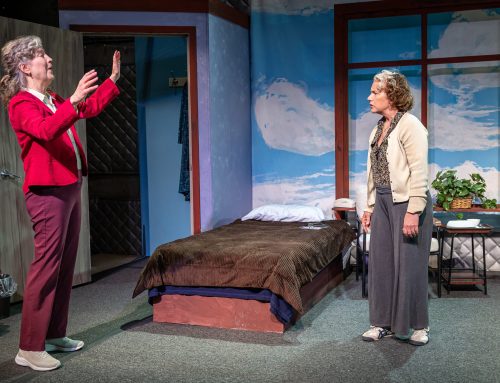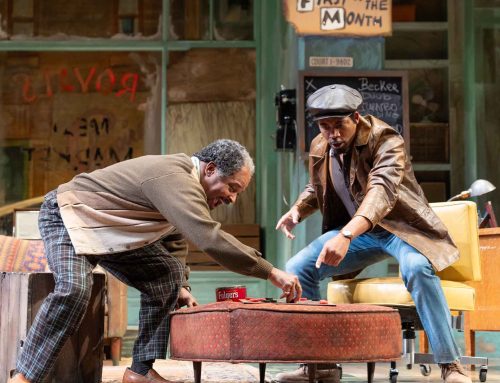August, 2006
Ashland, OR
at the Oregon Shakespeare Festival

Marco’s Cyrano is oversized, but not too big for Ashland’s outdoor Elizabethan Stage. His nose is tiny compared to the size of his personality. Gutsy, blustery, and impolitic on public matters, this Cyrano is seamlessly tender and reserved about his private feelings. Both sides of this man fill the stage — his presence comes from more than audio volume. It’s a great back-and-forth. Both the public and private styles are purely and honestly held. They seem opposites, but combined in front of us they make unified sense.
The production is in tune with Cyrano’s moods. His early petty pugilism is brisk and bragging, and on stage the characters march happily around, matching the biorthymic mood. The battle scenes with the Gascony Guardsmen roll from highs to lows in a fast-clipped rush of information. Later, after time as passed and Cyrano himself is slower, resigned to nibbling around love, the entire stage is quieter, soon to be gloomy. Director Laird Williamson uses his human instruments well as he allows the story to play out.
The Cyrano character feels written for Marco. I didn’t think like I was watching acting, I was watching a person live. [I saw Marco’s last performance. The dying of his mother forced Marco to leave the show in August. We have heard high praise for understudy Richard Howard who is an OSF star in his own right. His Cyrano is reportedly more cerebral and less dominating — hard to imagine after seeing Marco own the stage.]
Robin Goodrin Nordli’s Roxanne is exactly right. She’s realistically clueless as Cyrano helps his rival in love win Rozanne’s heart. She’s honestly oblivious during the battle scene, caught up in her own emotions. Later, it’s heartbreaking to watch her as she finally perceives Cyrano’s love for her. Her reaction is not really understated, but it is conveyed by eyes and posture rather than by histrionics.
The ensemble is uniformly excellent, and anything short of listing everyone in the program cheats a worthy actor of deserved praise. Nevertheless, some delivered especially wonderful moments: thank you to Robert Vincent Frank for his poet-loving pastry cooking, Dee Maaske for her steady companionship of Roxanne and later her similar support as the Mother Superior, and to Rene Millan for his rascally and dissipated Ligniere.
Cyrano was written over 100 years ago, in a slower, lower-tech time. Yet, the only times I have heard a remark about the 3 1/2 hour running time is when the comment was immediately followed by, “…, but you won’t notice.” You don’t. This Cyrano is a wonderful, modernly fast-paced, powerful evening of theater.
![]()





Amen.
I forgot to mention. I’ve already bought my tickets to go back in November and see this again.